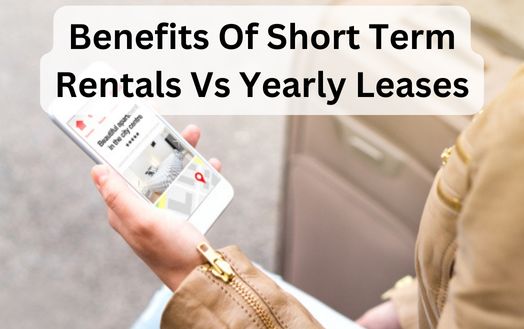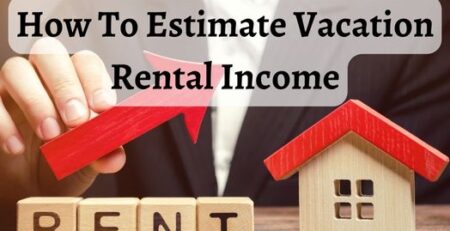Benefits Of Short Term Rentals Vs Yearly Leases
We’ve all debated short-term rentals versus annual leases. Making life decisions like this one can be scary. But short-term rentals have many advantages over long-term leases. This article will explain those so you can choose your next step.
Flexibility comes first. Short-term rentals let you stay for as long as you need without long-term commitments. You can travel abroad for shorter periods or move around town every few months. This gives more freedom than a yearlong lease. No security deposit means it’s cheaper too.
Renting longer leases saves money. Monthly rent may be less than a year’s lease, depending on where you live. Short-term renters don’t usually pay for damage, so any damage you cause won’t cost you (such as paying hefty fines. Many landlords offer discounts and incentives like free Wi-Fi and utilities, which can lower the cost of living temporarily compared to a year-long lease. This insightful article will show you the benefits of short term rentals vs yearly leases.
Overview Of Rental Properties
Renting was my best housing option. Today, there are many rental property types, each with pros and cons. Your needs and budget determine it. Consider price, lease flexibility, and convenience when choosing a rental.
Rental prices vary greatly depending on property type and location. If you choose a place near a city center or popular neighborhood, you may pay more or find a great deal. This depends on your down payment and lease agreement fees.
Lease flexibility is another consideration when renting. Short-term and year-long leases have pros and cons. Shorter leases offer more freedom but cost more due to security deposits or application fees, while longer contracts cost less but limit one’s ability to move without penalty if circumstances change.
Research a rental before choosing one that fits your lifestyle and budget. You can make a smart, budget-friendly choice with the right information. Let’s examine the types of rentals available.
Types Of Rentals

Short-term and long-term rental agreements exist. Short-term rentals last one month or less, while yearly leases last 12 months or more. Each type has pros and cons to consider before choosing.
Short-term rentals offer flexibility. Renters don’t have to sign a one-year lease. They are ideal for temporary housing for job relocation, visiting family or friends, vacationing, etc. Short-term renters can also switch properties, giving them more location and amenity options.
Long-term leases provide stability and lower monthly payments. When you sign a longer-term lease, many landlords waive application fees and security deposits. However, breaking the contract early could cost renters, limiting their mobility.
Depending on needs and preferences, short-term and long-term rentals have pros and cons. Consider all factors before choosing a type.
Advantages Of Short Term Rentals
Short-term rentals are more flexible than annual leases. This makes them attractive for those who want to maximize rental income and move if needed. Vacation rentals let you set your own schedule and stay length without committing to a long-term lease or missing out on potential renters.
Short-term rentals are also convenient and affordable. You can find an affordable place with all the comforts of home. Vacationers can book shorter stays in private homes or apartments instead of hotels or resorts. The lack of red tape allows travelers to book quickly and get back on the road.
Finally, short-term rentals allow landlords to control their property and income. Vacation property owners can set rates based on demand, seasonality, and other factors, unlike traditional leasing agreements that set rent prices for years. Owners can increase profits by charging higher rents during peak periods without entering into annual contracts. Landlords can increase their rental income by maximizing the return on each rental unit. Transitioning to the next section: Short-term rentals may seem like a great solution for renters and landlords, but there are some drawbacks to consider before committing.
Disadvantages Of Short Term Rentals
Short-term rentals may not be ideal. Short-term leases have many drawbacks.
Rent is a drawback. Most short-term leases cost more per month than yearly leases. Over time, this can cost more than a longer lease from the start.
Short-term rentals lack stability. Because they must renew their contract every few months or weeks instead of annually, these agreements don’t offer the same security as long-term leases. This requires signing a new lease and paying fees each time, which can add up.
Depending on local availability, finding a new place to live after your lease expires may be difficult. For those who want some stability in life, short-term leases can disrupt routines and important relationships like jobs and families.
- Rent Price
- Higher cost
- Adds up over time
- Lack Of Stability
- Must renew contract every few months/weeks
- Sign new lease each time & pay fees
- Could potentially have issue finding somewhere else to live when contract ends
- Disrupt Normal Routines/Important Relationships
- Can Disrupt Important Family and Social Relationships due to Constant Change of Location.
Benefits Of Yearly Leases

A yearly rental lease has many advantages. A yearlong rental provides stability. Knowing you won’t have to move every few months can make you feel more at home.
Long-term leases also save money over time. When you sign up for a longer term, like one or two years, landlords usually offer rent discounts or waive certain fees. This means that if you sign a year-long lease, you may save a lot of money compared to paying month-to-month rent, which is slightly more expensive.
Finally, by signing a yearly lease, tenants gain access to various landlord maintenance and repair services. For instance, most leases require the landlord to repair or maintain the property during the year. Tenants can leave these issues to their landlord, who has experience handling them, for peace of mind.
Maintaining and repairing rental properties throughout the lease year is easier with consistent help.
Disadvantages Of Yearly Leases
Annual leases have pros and cons. Before signing a lease, tenants should consider both sides. Breaking the lease if you need to leave before the end of the year can be difficult. Renters may have to pay extra or prove they found a new tenant. Longer leases give landlords more financial security than short-term rentals. That means property owners may not consider short-term renters.
Finally, full-year leases cost more than month-to-month rentals. This cost comparison doesn’t apply if you’re staying for a year, but it hurts those who want more housing flexibility. Understanding your options lets you make the best choice for your current and future needs.
Cost Comparison

Short-term rentals and yearly leases cost differently. Short-term rentals generate higher, longer-term rent for landlords. In the fast-changing rental market, this can maximize profits while providing quality housing. However, a yearly lease is best for stability and predictability. Instead of adjusting rates or finding new tenants every few months, you can count on one monthly payment.
Consider your property’s income goals when choosing between a short-term rental and a yearly lease. If you want long-term security, choose a yearlong contract over a short-term rental. Transitions are important too—weigh the pros and cons before making any decisions so you know what you’re getting into financially. Consider how flexible both types of agreements are before choosing one.
Flexibility
Short-term rentals give me flexibility. When I started renting, I realized there were many more ways to make money than signing long-term leases and hoping tenants would renew. Furnished or unfurnished short-term rentals are available. You can also switch out furniture.
I also don’t have to worry about tenants not paying month after month like they do with yearly contracts, making rent collection easier. This gives peace of mind because shorter terms mean less time between payments while still being able to collect larger amounts at once to cover all rental costs.
Short-term rentals have many advantages over traditional leases. They offer higher returns, potential real estate investment opportunities, and flexibility without committing to one tenant.
Real Estate Investment Opportunities

Real estate investing offers short- and long-term profits. Short-term rentals can boost income and portfolio diversification. These are the benefits of short term rentals vs yearly leases.
- Flexibility: You can rent out your property for as long or as short a time as you want. No lease commitment makes it easier to adjust rental prices to market conditions.
- Short-term rentals may qualify for tax benefits that traditional leasing does not.
- Vacation rentals generate more consistent cash flow than long-term leases.
- Vacation rentals have lower vacancy rates than long-term tenants due to peak season demand.
Real estate investing has risks and benefits. Before investing, you should research the pros and cons. Investors can maximize returns on short-term rental properties by considering location, market trends, and tenant demands.
Property management must be considered to maximize rental property investments, including routine maintenance, tenant screening, and financial management.
Property Management Considerations
Short-term and long-term rentals require some considerations. Rental property management comes first. Short-term rentals are harder to manage because tenants must respect your space. Renters should have clear rules and expectations for their on-site behavior and any damages or messes they leave behind.
Maintenance issues like broken window locks or leaky pipes must be addressed immediately to prevent further damage. To keep renters safe, always update and maintain safety features. Having a short-term property manager handle things can reduce your workload.
These factors are crucial when choosing between a short-term rental and a yearly lease. If something goes wrong during a tenant’s stay, you could face serious legal consequences if you don’t plan and pay attention. Next, consider the tax implications for yourself and your tenants.
Tax Implications
As you know, short-term rentals and yearly leases have different tax implications, so it’s important to understand each before choosing a rental strategy.
Long-term leases, vacation homes, and furnished units are the main leasing terms (which may or may not have an expiration date). The duration of these leases affects taxation. Vacation homes and furnished units have shorter tenancy periods than long-term leases.
From a tax perspective here’s what homeowners should consider when choosing a rental strategy:
Tax Benefits Of Short Term Rentals Vs Yearly Leases:
- Rental Income – Vacation home owners will likely receive higher rental income because they’ll rent out their properties on a short-term basis more frequently throughout the year. This could result in greater overall earnings compared to if they had just leased out their property once per year through a traditional annual lease agreement.
- Tax Deductions – Homeowners who rent out their properties as vacation homes can take advantage of certain deductions related to maintenance costs such as utilities, repairs, furnishings and insurance premiums. These deductions can help offset some of the cost associated with running a profitable business.
- Capital Gains Exemption – If a homeowner chooses to sell their property within five years after renting it out as a vacation home or short-term rental, they may be eligible for capital gains exemption. This allows them to exclude up to $250,000 from taxable income if filing taxes individually ($500,000 if filing jointly).
Understanding tax laws for different types of rentals is crucial to choosing a profitable rental strategy. Homeowners should consult an accountant or tax professional before making rental agreement and strategy decisions. Next, homeowner’s insurance requirements…
Homeowner Insurance Requirements

Short-term and yearly leases have different homeowner insurance requirements. When you rent out your property for a short time, you must carry liability insurance in case of accidents or damage. Since annual leases assume long-term residents with a vested interest in maintaining their space, they require less coverage.
As a new homeowner who wants both options, I suggest talking to an insurance agent about their policies based on my needs. This way, I’m covered whether someone stays at my house for one night or one year. Before committing, I should research different policies because some companies offer discounts based on how often I rent my place.
Understanding homeowner insurance requirements can save me money while protecting my rental property, whether it’s used by short-term guests or long-term tenants. With this knowledge and planning, I can keep everyone safe and secure while staying at my place.
Vacation Rental Pros And Cons
Vacation rental properties have pros and cons when comparing short-term rentals to yearly leases. As a real estate investor or homeowner, vacation rentals have many advantages over long-term leases.
Pros:
- Income Potential – Renters will pay higher rates than traditional tenants, which can mean more money in your pocket every month.
- Flexibility – With shorter stays, you have greater flexibility when choosing who rents out your home and how often you rent it out.
- Low Maintenance Costs – Vacation rental homes typically require less maintenance because guests tend to be respectful of their surroundings and do not stay very long.
- Tax Benefits – When renting out your property on a short-term basis, you may qualify for certain tax deductions that are not available with long-term leases.
Before investing in vacation rental properties, consider the drawbacks. To avoid regulatory compliance issues, you must understand local real estate investment laws. If not handled properly, landlord duties like property maintenance and tenant disputes can consume a lot of time and energy.
Regulatory Compliance Issues
Short-term rentals and long-term leases differ significantly in regulatory compliance. I have more control over who lives in my vacation rental. This lets me monitor tenants’ compliance with local noise and smoking laws. Since long-term tenants usually stay for a week or two, I don’t have to worry about damage.
However, long-term tenants may find it harder to comply with laws and ordinances. To avoid further losses, eviction proceedings must begin immediately if someone moves out after six months and hasn’t paid rent for three months. Short-term renters don’t require landlords to research local laws before signing a lease.
Whether you rent your property long-term or short-term, regulatory compliance requires extra work. However, having clear expectations beforehand makes navigating these legal obligations much easier. Let’s see how this affects each option’s finances.
Long-Term Financial Impacts

Short-term rentals have significant financial advantages over annual leases. Rentals offer lower rates and more payment options. I can save money on rent each month and plan for unexpected expenses without breaking my lease. Short-term rentals do not require long-term commitments or large security deposits.
Short-term rentals over year-long leases allow me to quickly adjust my budget. If I lose my job or move, being able to quickly change my living situation makes all the difference. If something happened, a traditional lease would require expensive termination fees or months of unpaid rent, which could put someone in financial trouble quickly.
Renting lets you extend or shorten your stay without penalty, giving you more financial control. This gives me peace of mind knowing that I can manage my finances better and allows me to be more creative with my monthly spending by leaving room for other investments and opportunities.
Final Thoughts
I now compare short-term rentals to annual leases. I know how to rent my property by understanding legal requirements, marketing strategies, liability protections, and taxes.
As a property owner, I choose between yearly leases and short-term rentals. My location and resources determine my choice.
In conclusion, renting my property can be financially rewarding if done right. I’m confident I’ll choose short-term rentals or yearly leases after considering the factors discussed today. After reading this article, you are already aware of the benefits of short term rentals vs yearly leases.
FAQ
What Are The Legal Requirements For Renting Out My Property?
Renting my property requires legal considerations. As a homeowner and landlord, I must follow all local tenant screening, lease, security deposit, rent collection, and other laws.
To help me stay on track and up-to-date with the trends of rental properties, here are some key points I should consider:
- Having an airtight lease contract in place before accepting tenants
- Gathering thorough background checks on potential renters
- Regularly inspecting the premises for safety and maintenance issues
If I want to have good relationships with tenants, I need to provide good service throughout their tenancy. This means answering their questions about my rental space. It also requires prompt property maintenance. I can ensure everyone is happy with the rental process by keeping these commitments in mind.
Understanding and following local housing regulations will help me and my tenants negotiate lease renewals or evictions. Being proactive about researching what’s required by law ensures that everything goes smoothly during tenancy periods—and gives me peace of mind that I’m protecting myself and my tenants.
What Is The Best Way To Market A Short-Term Rental?
Marketing a short-term rental requires several considerations. Reach the right customers first. My property won’t rent if nobody knows about it. Second, I want my listing to stand out from competitors to attract customers. Finally, I’ll need a good pricing and promotion strategy to entice guests to book with me.
Airbnb, HomeAway, and VRBO are good places to start advertising my property. Renters can filter listings on these sites. I’ll attract more customers by optimizing my profile photo and describing my property’s amenities.
Visuals like videos or virtual tours can help your space stand out from competitors. Offering discounts or special packages during certain times of the year could also help draw attention away from properties that don’t offer these deals—leading them straight to my inbox. Ultimately, creative short-term rental marketing strategies depend on industry trends and target audience knowledge.
With this knowledge, I can create an actionable plan that considers branding and budgeting while delivering results. To maximize success in booking out rooms throughout the year, I must carefully execute each step, from setting up automated email campaigns targeted at specific guest segments to designing eye-catching social media posts demonstrating why staying in my rental beats any hotel experience.
How Can I Protect Myself From Liability As A Property Owner?
As a property owner, I understand the need for liability protection. Short-term rentals require many decisions. Know who’s responsible and what to do to protect yourself and others.
Before letting renters in, you must have an agreement with them. This should include rent, length of stay, liabilities, and restrictions. Preparing ahead of time will help both parties understand the property’s rules.
Property owners should also have insurance to cover tenant damage. I feel confident renting my property as a short-term rental because my insurance company will cover any unexpected costs due to tenant negligence. Ensuring my renter follows local laws and regulations also protects me from legal issues.
These precautions give me confidence that I can provide high-quality accommodations without risking liability. By knowing my rights and responsibilities ahead of time, I can keep my tenants and myself safe throughout the process.
What Are The Tax Implications For Landlords Of Short-Term Rentals?
Before choosing short-term or annual leases, landlords must consider the tax implications. Landlords should know their state’s and municipality’s tax laws. To clarify, here are four tax obligations to remember:
- Landlords must report rental income on their federal taxes.
- Depending on where you live, there may be local taxes imposed on rental income as well as other costs such as property inspections or licensing fees.
- If your rental activity qualifies as a business operation, you may qualify for additional deductions related to running your business such as depreciation expenses and travel expenses incurred while managing your properties.
- When renting out space through online platforms like Airbnb or VRBO, it is important to keep track of any applicable service fees and commissions charged by those companies since they may need to be reported on your taxes depending on how much income was generated through the platform.
I find it helpful to consult with a professional accountant to determine the best lease agreement for both parties. They can help me understand all of my deduction options and choose the best one financially. They can also help with paperwork, such as tracking rent payments and filing required IRS documents at year’s end.
Knowing all these factors ahead of time helps me comply with all laws and regulations, saving me headaches when filing taxes each April 15th.
Are There Any Special Regulations Or Zoning Requirements I Need To Be Aware Of?
I must follow short-term rental regulations and zoning. These vary greatly by city or county. Before renting my property as a short-term rental, I must know all local laws.
My neighborhood’s zoning is the first step. Most cities have different residential zones with restrictions on how many people can live at an address, how long they can stay, and whether business activities are allowed. Next, I should check if my area requires a bed tax or occupancy permits for short-term rentals.
Research any additional regulations for home-based vacation rental businesses. Fire safety, smoke detectors, carbon monoxide monitors, noise ordinances, and other municipal regulations may apply. Researching these potential pitfalls will help me avoid legal issues when renting out my space. Now is better than later.











